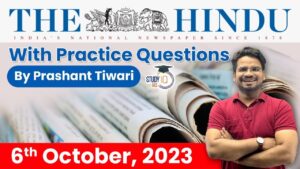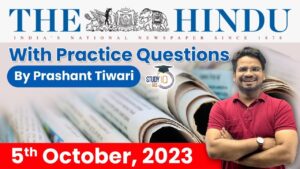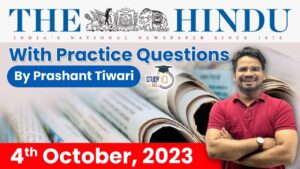The Hindu Newspaper Analysis for UPSC

The Hindu Newspaper Analysis 28 July 2023
- The Supreme Court on Friday asked the Centre and at least six States to respond to a plea about recurring lynchings and mob violence.
- The plea said gruesome incidents of mob fury and vigilantism continue to happen despite a five-year-old top court judgment, which had made the government machinery squarely accountable for protecting the lives of victims, including minority community members.
- Mob lynching is a violation of human dignity, Article 21 of the Constitution, and a gross infringement of the Universal Declaration of Human Rights.
- Such incidents violate the Right to Equality and Prohibition of discrimination, which are enshrined in Articles 14 and 15 of the Constitution of India.
- In July 2017, the Supreme Court in the case of Tahseen s. Poonawala v. UOI had laid down several preventives, remedial and punitive measures to deal with lynching and mob violence.

- The Sixteenth Finance Commission is due to be set up shortly.
- The combined government debt-GDP ratio had also shot up close to 90% at the end of 2020-21. Many States show large fiscal imbalances too.
- The Fourteenth Finance Commission had raised the share of States in the divisible pool of central taxes to 42% from 32%. This was revised to 41% when the number of States in India was reduced to
- The share of individual States in the Centre’s divisible pool of taxes is determined by a set of indicators that includes population, per capita income, area, and incentive-related factors such as forest cover and demographic change.
- One innovation which may be relevant in this context is to set up a loan council, as recommended by the Twelfth Finance Commission.


- What is the Finance Commission?
- It is a constitutional body constituted every 5 years by the President of India under Article 280 of the Indian Constitution to define the Centre-states financial relations.
- The First Commission was established in 1951 under The Finance Commission (Miscellaneous Provisions) Act, 1951.
- Individual commissions operate under the terms of reference (ToR) which are different for every commission, and they define the terms of qualification, appointment and disqualification, the term, eligibility and powers of the Finance Commission.
- As per the constitution, the Commission consists of a chairman and four other members.

- The United Nations Secretary-General, António Guterres, this week reiterated the consequences of the climate catastrophe that has enveloped the globe. The earth had passed from a warming phase into an “era of global boiling”, he said at the UN’s headquarters in New York.
- Scientists from the World Meteorological Organization (WMO) and the European Commission’s Copernicus Climate Change Service described conditions this month as “rather remarkable and unprecedented”, with July seeing the hottest three-week period on record. the climate — it bears reminding — waits for nobody.



- India and Japan would rather work to strengthen their “peacetime cooperation”, side-stepping a question about how the two countries would cooperate in case of a conflict in the Taiwan Strait, or between India and China at the Line of Actual Control (LAC).
- During heightened U.S.-China tensions in the Taiwan Strait after
- S. Speaker Nancy Pelosi’s visit to Taipei in August 2022, India had issued its own statement urging “restraint”, but had not joined the Quad partners U.S., Japan and Australia Foreign Ministers in a statement demanding that China cease military exercises in the Taiwan Strait.

- Prime Minister Narendra Modi on Friday said India would emerge as a global hub of semiconductor and chip-making industry, as he made a strong pitch to global investors, while inaugurating the ‘Semicon India 2023’ conclave in
- At the ‘Semicon India’ conference, U.S. chipmaker Advanced Micro Devices (AMD) announced plans to invest around $400 million in the country over the next five years and build its largest design centre in the tech hub of
- The conference was attended by the top representatives from major companies such as Micron Technology, Applied Materials, Foxconn, SEMI, Cadence, and AMD.
Policy initiatives in India
- Make in India:This aims to transform India into a global hub for Electronic System Design and Manufacturing (ESDM).
- PLI scheme:In December 2021 the Centre sanctioned ₹76,000 crore under the production-linked incentive (PLI) scheme to encourage the manufacturing of various semiconductor goods within India.
- DLI scheme:It offers financial incentives, design infrastructure support across various stages of development and deployment of semiconductor design for Integrated Circuits (ICs), Chipsets, System on Chips (SoCs), Systems & IP Cores and semiconductor linked design.
- India Semiconductor Mission (ISM):The vision is to build a vibrant semiconductor and display design and innovation ecosystem to enable India’s emergence as a global hub for electronics manufacturing and design

- Prime Minister Narendra Modi on Friday called on the G-20 nations to work constructively for an effective, international legally binding instrument to end plastic pollution.
- He was addressing the G-20 Environment Ministers’ Meeting here through videoconference. Detailing India’s progress with regard to the climate action plan or the ‘Nationally Determined Contributions’ (NDCs), Mr. Modi said the country achieved its installed electric capacity from non-fossil fuel sources nine years ahead of the target of 2030.
- He said India was one of the top five countries in the world in terms of installed renewable energy capacity and added that the country had set a target of attaining ‘Net Zero’ by 2070.
- Modi stressed the need to enhance action on commitments under the ‘UN Climate Convention’ and the ‘Paris Agreement’ to help the Global South fulfil its developmental aspirations in a climate-friendly way.


- The Western Ghats, also known as the Sahyadri Hills, are well known for their rich and unique assemblage of flora and fauna.
- The range is called Sahyadri in northern Maharashtra and Sahya Parvatham in Kerala.
- The rapid shift from traditional local grain cultivation to monoculture plantations of mango and cashew in the Sahyadri plateaus of Maharashtra is impacting elusive amphibians, insects, and reptiles that live under a crop of loose rocks.
- “The rapidly changing agricultural trends in the rock outcrops include abandoning traditional local grain cultivation, and establishing monoculture plantations of mango and cashew by destroying the natural plateaus,”


 The Hindu Newspaper Analysis 6 October 2...
The Hindu Newspaper Analysis 6 October 2...
 The Hindu Newspaper Analysis 5 October 2...
The Hindu Newspaper Analysis 5 October 2...
 The Hindu Newspaper Analysis 4 October 2...
The Hindu Newspaper Analysis 4 October 2...





















